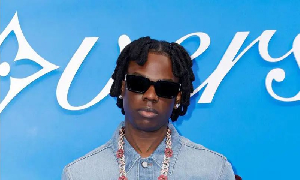Accra, March 22, GNA - The National Executive
Committee of the Ghana National Canoe Fishermen Council
(GNCFC) on Tuesday called on the government to enforce
the Fisheries Regulation Law 2010 (L.I. 1968) in totality to
bring sanity into the industry. "The law enforcement agencies should go the whole hog
to enforce the regulation to the fullest extent," Nii Abeo
Kyerekuandah IV, Executive Secretary of GNCFC said. Addressing the media on the recent demonstrations by
selected fishing communities against the passing of the
Fisheries Regulation Law a few months ago, Nii
Kyerekuandah called for the blanket enforcement against all
bad and unacceptable fishing practices. Parliament enacted the Regulation late last year to give
effect to the fisheries Act 2002 (Act 625) and prescribed
measures for conservation, management and development
of fisheries and aquaculture in Ghana. The law outlawed bad practices such as pair trawling,
light fishing, use of under-size mesh nets, monofilament or
rubber nets in marine fishing, dynamite and harmful
chemicals in fishing. Nii Kyerekuandah said the recent demonstrations in
some coastal areas by some fishermen against the law were
uncalled for because the legislation was to protect them and
future generation. "I believe we all know that fishing, like farming, is time
honoured indigenous vocation which has been passed on
from one generation to another and in conservative terms it
is currently providing means of livelihood to about 10 per
cent of Ghana's population. "It, therefore, stands to a reason=85 that it is an industry
that deserves to be given adequate attention, recognition and
support," he added. He said gone were the days that the wealth of aquatic
resources was assumed to be unlimited gift of nature,
adding that with increased knowledge and the dynamic
development of fisheries after the Second World War, the
myths had faded in the face of the realisation that aquatic
resources, although renewable, were not infinite and must be
properly managed. Nii Kyerekuandah said Ghana was not the only country
where fishing was an important industry and cited other
African countries such as Togo, La Cote d'Ivoire, The
Gambia, Senegal, Angola, and Mauritania where their
fisheries laws were enforced with all the rigidity that it
required. There was a general consensus among the fisher folks
present that the law was made to protect their interest and
called on others to join hands with the enforcement agencies
to ensure compliance.
General News of Tuesday, 22 March 2011
Source: GNA
GNFC backs enforcement of Fisheries Regulation Law
Entertainment











